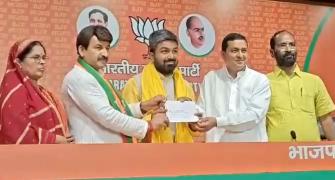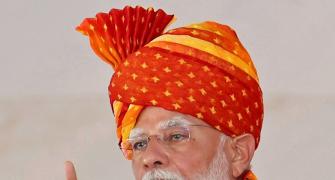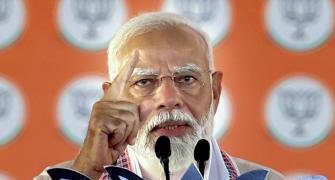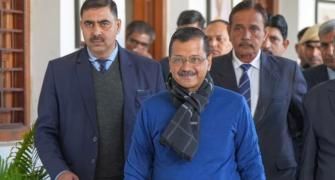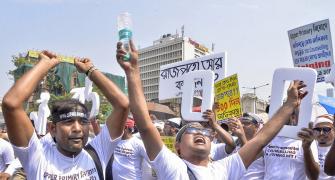Important for Chinese President Xi Jinping will be Zhao's discussions on the issues of Tibet and the Dalai Lama and his assessment of the likely results of India's coming national elections, notes former senior RA&W officer and China expert Jayadeva Ranade.
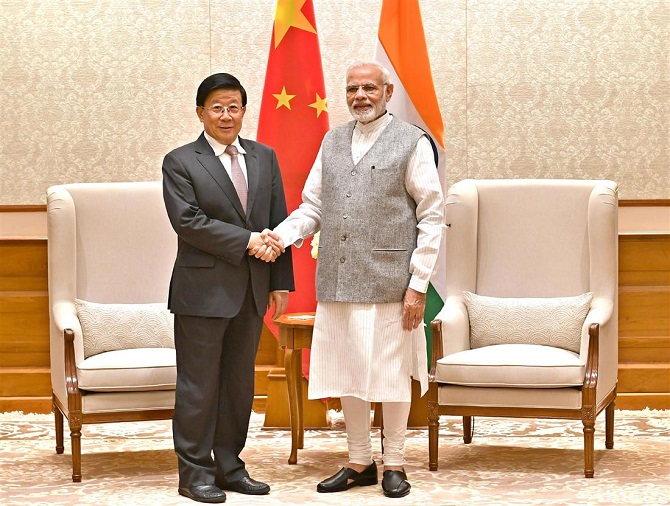
Chinese State Councillor and Minister of Public Security Zhao Kezhi arrived in India on October 22 on the first leg of his tour.
Zhao's 20-member delegation comprised 13 officials from China's ministry of public security and three officials from the ministry of foreign affairs. He later travelled to Bangladesh where he had high-level meetings including with Bangladesh Prime Minister Sheikh Hasina.
The visit followed that by Chinese Defence Minister Wei Fenghe to India in August and is obviously part of efforts to portray that India-China relations are improving following the Modi-Xi summit meeting in Wuhan in April.
Notwithstanding this and highlighting their territorial claims, Chinese troops intruded into Arunachal Pradesh just days prior to Zhao's arrival.
During the Chinese defence minister's visit too, a similar intrusion by Chinese troops in Demchok in Ladakh was vacated weeks after his departure.
Important for Chinese President Xi Jinping will be Zhao's discussions on the issues of Tibet and the Dalai Lama and his assessment of the likely results of India's coming national elections.
In Delhi, Zhao met his host Home Minister Rajnath Singh, National Security Advisor Ajit Doval and Prime Minister Narendra Damodardas Modi. That India did not genuflect to avoid giving imaginary offence to China and Kiren Rijiju, minister of state for home and a member of Parliament from Arunachal Pradesh, attended the meetings is encouraging.
Perhaps to add apparent substance to the visit, a bilateral security cooperation agreement was signed. The agreement includes areas like intelligence sharing, exchange programmes, cooperation in disaster mitigation etc.
In material terms, though, there is likely to be negligible, if any, cooperation in these areas.
Actually, there is no possibility of substantive cooperation in counter-terrorism so long as China remains protective about Pakistan and seeks to insulate it from accusations by other countries.
Chinese and Pakistani intelligence agencies have very close and long-standing ties. China's interests and its relationship with Pakistan are far too strategically important for any change in China's policy towards Pakistan and the current uncertainties regarding the China Pakistan Economic Corridor will serve only to strengthen Beijing's commitment to Pakistan.
Confirming that talks on terrorism made no headway, China's stand on cooperation in counter-terrorism was made public at the routine Chinese foreign ministry press briefing in Beijing on October 23, barely a day after the Indian and Chinese delegations met in New Delhi.
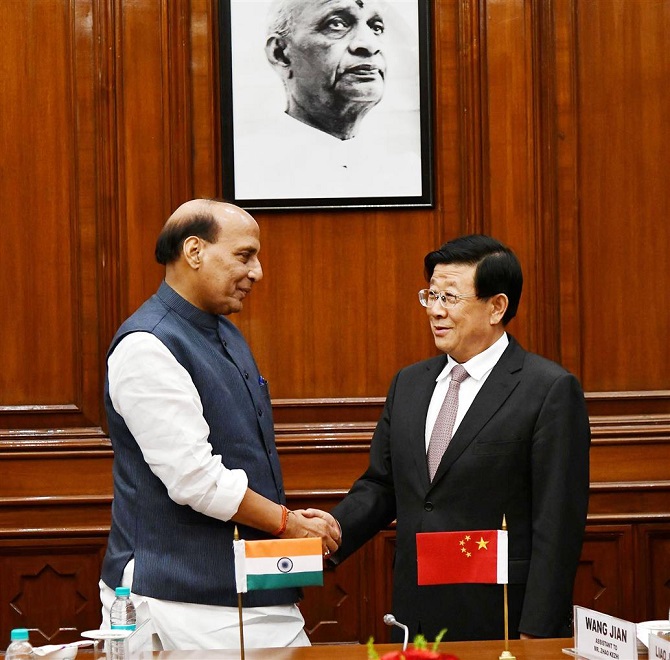
In response to a question about Beijing's position regarding Pakistan harbouring internationally acknowledged terrorists like Masood Azhar, Muhammad Sayeed etc, Chinese spokesman Hua Chunying emphasised that there is no change in China's position which it has made known on a number of occasions.
The Chinese delegation would have again pressured India to re-open talks with the new government in Pakistan and resolve the Kashmir issue. It would have also emphasised the importance of the CPEC and the need to ensure its security.
Beijing's immediate concern about Uyghurs transiting through Pakistan into China's Xinjiang-Uyghur Autonomous Region are currently being adequately met by Pakistan's security forces. Chinese agencies also have a free hand inside Pakistan.
China and Pakistan are additionally cooperating and furthering each other's interests in Afghanistan.
The other issue troubling China is that of the Rohingya who, according to Beijing, are being radicalised by Al Qaeda. Beijing is concerned that these elements will cross into China through the porous borders with Myanmar.
China earlier suggested that India should cooperate in this area, but Zhao's delegation is very unlikely to have offered any information regarding Indian north east insurgents visiting Yunnan province or purchasing arms in Kunming.
The Tibet issue undoubtedly ranked high on the Chinese delegation's agenda and would have been pushed hard.
It is likely they sought to exchange views on the Dalai Lama and urged curbs on the Dalai Lama's set-up in Dharamsala, accusing it of infiltrating and carrying out anti-China activities inside Tibet.
The Chinese have an interest in the situation surrounding Uyghen Thinley Dorje, recognised as the Karmapa by the Chinese authorities and the Dalai Lama and who 'escaped' from Tsurphu Monastery in Tibet, particularly in the backdrop of the numerous news reports -- many inspired -- in recent months.
Reliable reports suggest that China made conciliatory overtures to Dorje while he was in New Jersey.
Clear pointers to the importance of Tibet-related issues are the inclusion in the delegation of Zhang Hongbo, director of public security of the Tibet Autonomous Region (TAR), and Hou Yanqi of the Chinese foreign ministry who has served in its department of external security affairs which also looks after matters relating to Tibetans outside China.
Zhang Hongbo, an ethnic Han who was born in Sichuan, has been working in the TAR since at least 1982 and has extensive experience in security work. His last appointment was as mayor of Shigatse, one of TAR's two largest cities and also the traditional seat of the Panchen Lama.
He will have detailed knowledge of Tibetan issues including the interactions between Chinese authorities and Tibetan Buddhist monks in India and elsewhere.
Other issues like cross-border movement of the Uyghurs, complaints of Chinese businessmen about limited duration visas and India's objections to the issue by China of stapled visas for residents of Arunachal Pradesh and Jammu and Kashmir etc would have been on the agenda.
Zhao will have raised trade issues and expressed the hope that India does not follow the US and impose restrictions on Chinese telecom, IT and other companies operating in India.
An important aspect of Zhao's visit will be his assessment to Chinese President Xi Jinping after in-house discussions with the Chinese ambassador and others. His briefing will be important as it coincides with the election tempo building up in India.
In addition to being minister for public security, Zhao is also a long time confidant of Xi Jinping.
Jayadeva Ranade, former Additional Secretary in the Cabinet Secretariat, Government of India, is presently President, Centre for China Analysis and Strategy.



